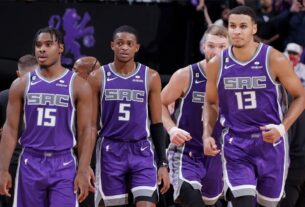Introduction
In the world of professional ice hockey, few teams carry a reputation for toughness quite like the Philadelphia Flyers. Known for their physical style of play, passionate fan base, and a storied history of intense rivalries, the Flyers have earned a unique place in the hearts of hockey fans. But what is it that makes the Philadelphia Flyers synonymous with toughness? In this article, we’ll explore the factors that have contributed to the Flyers’ reputation and why they continue to be celebrated for their rugged style of play.
A Rich History of Physicality
The Philadelphia Flyers were established as an expansion team in the National Hockey League (NHL) in 1967. From the very beginning, they made it clear that they were going to play the game their way – with grit, aggression, and physicality. The team’s first head coach, Keith Allen, emphasized a tough, blue-collar style of play that would set the tone for years to come.
During the early years, the Flyers were dubbed the “Broad Street Bullies” due to their relentless physical play and a willingness to drop the gloves at a moment’s notice. The team’s roster featured legendary enforcers like Dave “The Hammer” Schultz, Bob “Hound” Kelly, and Andre “Moose” Dupont. These players were not only skilled at throwing punches but also possessed the hockey skills to contribute on the score sheet. Schultz, for example, scored 20 goals in the 1973-74 season, showcasing that the Flyers’ toughness was not just limited to fisticuffs.
The Broad Street Bullies era culminated in back-to-back Stanley Cup championships in 1974 and 1975. These championships solidified the Flyers’ reputation for being not only tough but also winners. Their brand of hockey resonated with fans and set the standard for how the team would be perceived in the years to come.
A Passionate Fan Base
One of the reasons the Flyers’ toughness is so celebrated is their passionate fan base. The city of Philadelphia is known for its passionate sports fans who expect nothing less than maximum effort and grit from their teams. The Flyers have consistently delivered on that front, and as a result, they have a dedicated following that thrives on the team’s hard-nosed style of play.
The Flyers’ fans, often referred to as the “Orange and Black” faithful, have embraced the team’s tough image. They proudly wear their team colors and are known for their raucous cheers and boisterous support during games. This fan base’s unwavering commitment to the Flyers only serves to reinforce the team’s reputation for toughness.
Intense Rivalries
Another factor that has contributed to the Flyers’ toughness is their intense rivalries with other teams. The Flyers have had memorable rivalries with teams like the New York Rangers, New Jersey Devils, and Pittsburgh Penguins, just to name a few. These rivalries have been characterized by physical play, heated confrontations, and epic playoff battles.
One of the most famous rivalries in NHL history is the one between the Flyers and the Boston Bruins. In the 1970s, the Flyers and Bruins engaged in a series of brutal matchups that came to be known as the “Battle of the Broad Street Bullies vs. the Big Bad Bruins.” These games were marked by bone-crushing hits, fights, and intense animosity. The Flyers’ toughness was on full display during these showdowns. And they cemented their place as one of the league’s toughest teams.
The Legacy of Toughness
The Flyers’ legacy of toughness has left an indelible mark on the NHL. While the game has evolved over the years, with an increased emphasis on speed and skill. The Flyers have managed to maintain their identity as a tough team. They have adapted to the changing landscape of hockey while still valuing physical play and grit.
In recent years, players like Wayne Simmonds, who was known for his willingness to drop the gloves and contribute offensively, exemplify the Flyers’ commitment to toughness. Simmonds was beloved by Flyers fans for his fearless style of play and dedication to the team.
Additionally, the team’s current captain, Claude Giroux, may not be known for his fighting, but he embodies the Flyers’ tough spirit in different ways. Giroux leads by example with his work ethic, tenacity, and ability to perform under pressure.
Conclusion
The Philadelphia Flyers have earned their reputation for toughness through a combination of their rich history. Passionate fan base, intense rivalries, and commitment to their unique style of play. While the NHL has evolved over the years, the Flyers have managed to stay true to their roots while adapting to the modern game. Whether it’s the “Broad Street Bullies” of the past or the current generation of Flyers players. The team’s commitment to toughness remains a defining characteristic that endears them to fans and keeps their legacy alive.
FAQS
Q1: Are the Philadelphia Flyers still as tough as they were during the “Broad Street Bullies” era?
The Flyers have evolved over the years, and while they may not be as physically aggressive. As they were during the 1970s, they still maintain a reputation for being a tough team. Their style of play has adapted to the modern NHL. Which places a greater emphasis on speed and skill. But they continue to value physicality and grit.
Q2: What are some of the most memorable moments from the Flyers’ history of toughness?
Some of the most memorable moments include the back-to-back Stanley Cup championships in 1974 and 1975. The intense rivalry with the Boston Bruins during the 1970s, and iconic fights involving players like Dave Schultz. More recent moments include playoff battles and the contributions of players like Wayne Simmonds and Claude Giroux.
Q3: How do the Flyers’ fans contribute to their reputation for toughness?
The passionate and dedicated fan base, often referred to as the “Orange and Black” faithful. Plays a significant role in reinforcing the Flyers’ reputation for toughness. Their unwavering support, loud cheers, and enthusiastic embrace of the team’s blue-collar image create an atmosphere that encourages.




